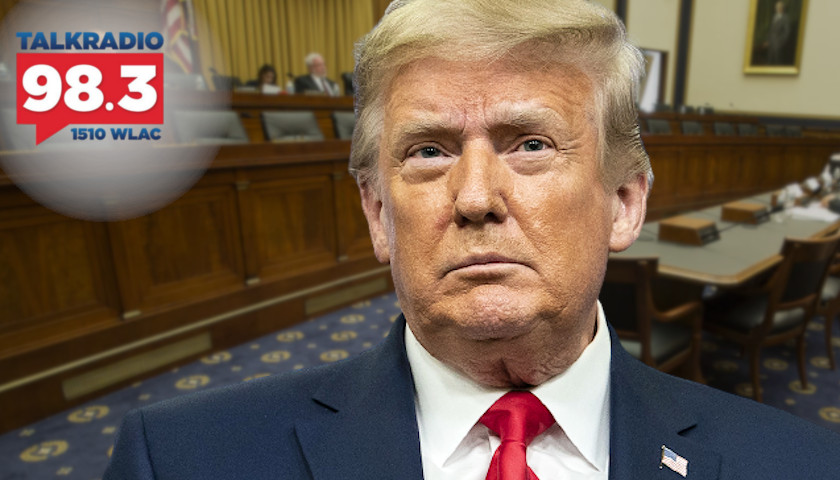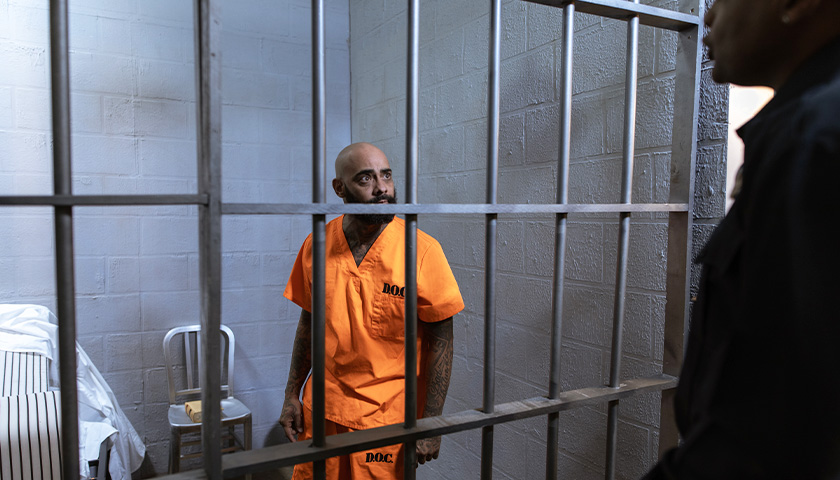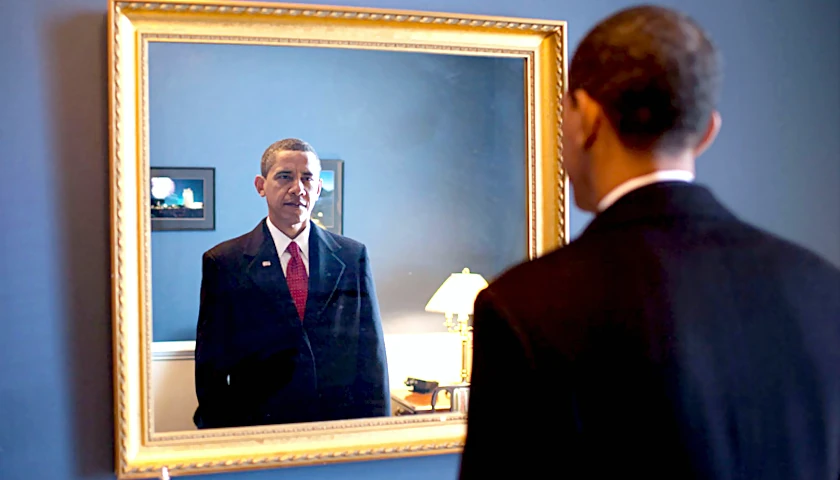Live from Music Row Wednesday morning on The Tennessee Star Report with Michael Patrick Leahy – broadcast on Nashville’s Talk Radio 98.3 and 1510 WLAC weekdays from 5:00 a.m. to 8:00 a.m. – host Michael Patrick Leahy outlines the unconstitutionality of the impeachment trial of private citizen Donald Trump by defining the meaning of impeachment as interpreted in the United States Constitution.
Michael Patrick Leahy:
(Senator John Kennedy clip plays)
That was Senator John Kennedy of Louisiana who was among the 44 who voted correctly that a private citizen even a former president cannot be impeached under the Constitution. Now, there’s been a lot of talking back and forth about what’s constitutional and what’s not.The Democrats on the left and everybody on the left is making up stuff frankly. And let’s go to the Constitution. Let’s see what the Constitution actually says.
So let’s begin actually with Article 3 Section 2 Clause 3 of the Constitution. This is about the Judiciary. “The trial of all crimes except in cases of impeachment shall be by jury and such trial shall be held in the state where the said crime shall have been committed.” So therefore, crimes are tried by jury, except in the case of impeachment.
That’s the first thing the Constitution has to say.
Then, who can be impeached? That’s under Article 2 Section 4.
I’ll read it to you right now. “The president vice president and all civil officers of the United States shall be removed from office on impeachment for or and conviction of treason bribery or other high crimes and misdemeanors.” So there are two elements of that text in the Constitution: (1) Who can be impeached and (2) for what purpose?
(1) Who?
The president, vice president, and civil officers of the United States.
So that actually under the Constitution you could argue a civil officer is a member of the cabinet. You could argue that it’s an elected member of the House or the Senate. . .
[Note: The Supreme Court has never ruled on whether a member of Congress is a civil officer of the United States subject to impeachment. In 1797, the House impeached Sen. William Blount of Tennessee. He was expelled from the Senate shortly after he was impeached. In 1798, the Senate dismissed the House’s impeachment of Blount by a vote of 14 to 11, now a former senator, on the grounds that a member of Congress was not a civil officer of the United States. Subsequently, the House has never again impeached a member of Congress.]
(2) For what purpose?
Well, it’s for removal from office. That’s it. That is the purpose. So right there Donald Trump is not the President of the United States. He is not the vice president. He’s not a civil officer. He is a former president and a private citizen. On that basis alone the Senate does not have the constitutional authority to hold a trial on his impeachment.
Now, let’s go back to some other elements on this, and let’s look at Article 1 Section 2 Clause 5.
What does that say?
“The House of Representatives shall choose their speaker and other officers and shall have the sole power of impeachment.”
Let’s stop on that just for a moment. The sole power of impeachment. So this trial is to determine whether or not the president, vice president, not a private citizen has committed impeachable offenses.
One of the elements of this, and this would be my first argument, is did the House of Representatives provide the president due process in this second impeachment?
The answer is no.
Due process means they get an opportunity to present their case as to why they should not be impeached. They didn’t do that. So number one, that’s a problem. I’ll read what it says the Senate has to do, their authority under Article 1 Section 3 and we’ll start with Clause 6 and Clause 7.
Clause 6 reads, “The Senate shall have the sole power to try all impeachments. ”
We’ll come back to that in a minute.
“When sitting for that purpose they shall be on oath or affirmation when the president of the United States is tried the chief justice shall preside and no person shall be convicted without the concurrence of two-thirds of the members present.”
I’m going to read Clause 7 here and then come back to Section 3 Article 1.
“Judgments in the cases of impeachment shall not extend further than to removal from office and disqualification to hold and enjoy any office of honor, trust, or profit under the United States.”
So what we’re saying here is a couple of things.
Let’s go back to Clause 6. “The Senate shall have the sole power to try all impeachments.”
Now under that here’s what I think the Senate should have done, because the House impeached then-president Trump without providing him the due process rights. And the Senate has the sole power to try impeachments when that transmission of the document stating president had been impeached arrived at the Senate.
Here’s what I think Mitch McConnell should have done, then the Majority Leader. He should have said, look under the United States we have rules and regulations and rights provided to everyone. Due process under the law is provided for every citizen in criminal trials and any trial. And this impeachment trial requires due process. And he should have said thank you very much.
I’m going to send this back to you because you did not provide the president the due process rights that every citizen in America is guaranteed. So that’s point number one.
Point number two on this is the following: There is a conflict of interest on this particular charge. What is that conflict of interest? The conflict of interest is the following: Both the House, through the Speaker, and the Senate,through then-Majority Leader Mitch McConnell, have some liability for the breach on the Capitol that occurred on January 6.
What do I mean by that?
Why did that breach occur? Well, you saw that the president actually in the speech that he gave on the Ellipse about a mile from the Capitol with a crowd of 300,000 people said you can go there but peaceably. Peaceably go there and exercise your First Amendment rights. That’s all he said.
Now there was a breach. Why did that breach happen? Who is responsible for that breach?
Well, there were a bunch of you know, crazy people, a guy in with a horned helmet with Viking horns there and others. Some are Trump supporters, some were Antifa and some were Black Lives Matter.
Why did the breach happen? The breach happened due to the dereliction of duty of the Capitol Hill Police. They did not have enough police there.
In fact, Mark Meadows said that the president offered to provide 10,000 National Guard before the event to help protect the Capitol. And the capital police chief turned him down. Why is that? To whom does the Chief of Police at the Capitol Hill Police report? To a board controlled by, wait for it…Speaker of the House Nancy Pelosi and then-Senate Majority Leader Mitch McConnell.
So they have a conflict of interest in trying the president because there is a question which we don’t know the answer to because the president was denied due process in the House of Representatives prior to the impeachment. There’s a conflict of interest with both. Neither the Senate nor the House does have the [moral] authority to impeach him because of the conflict of interest issue. Were they responsible for that breach? That’s a very good question.
Was the Senate Majority Leader McConnell in part responsible for failing to provide proper direction to the Capitol Hill Police Chief about how you should prepare for this event? That’s a very good question.
So you’ve got conflicts of interest all over the place. You have absolutely nothing in the Constitution, not one word allows the Senate to conduct an impeachment trial of a private citizen, be that private citizen the former president, of former vice president, or a former civil officer of the United States.
Listen to the full first hour here:
– – –
Tune in weekdays from 5:00 – 8:00 a.m. to the Tennessee Star Report with Michael Patrick Leahy on Talk Radio 98.3 FM WLAC 1510. Listen online at iHeart Radio.





